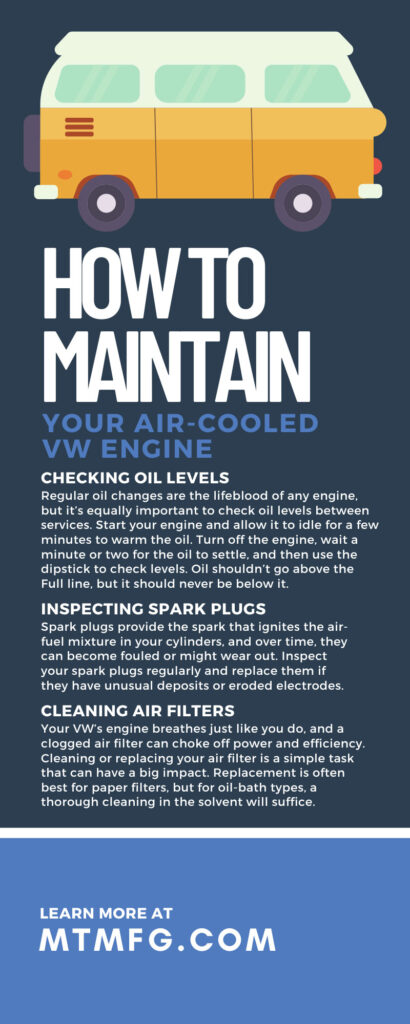When it comes to classic cars, the iconic Volkswagen isn’t only a symbol of many eras; it also showcases an innovative and lasting design that captures hearts and roads across the globe. The air-cooled engine hums at the heart of every classic Bug or Bus, and epitomizes the spirit of mechanical simplicity and rugged dependability. Ensuring the continuation of that distinctive thrum requires diligent maintenance, especially as these engines become phased out from newer models.
For the VW enthusiast, there’s a special joy in knowing that with the right knowledge and a little elbow grease, you can keep your air-cooled engine going for decades. This expansive guide will uncover a meticulous approach to maintaining their air-cooled engines, with an in-depth look at the tools, techniques, and tips necessary for preserving these automotive treasures.
Tools of the Air-Cooled Trade
Before you can perform any maintenance on your beloved air-cooled VW engine, having the right tools in your arsenal is essential. Here’s a concise list of items that should be within arm’s reach as you prepare for a tuning session:
- High-Quality Socket Set: A good set with various sizes will help you tackle most tasks.
- Feeler Gauge: Crucial for setting valve clearances precisely.
- Quality Torque Wrench: For those jobs where torque settings are critical like head tightening.
- Oil Drip Pan: A wide, shallow pan to capture old oil during changes.
- Spark Plug Socket: A deep, thin-walled socket that is indispensable for plug changes.
- Compressor and Regulator: Vital for testing and setting carburetor float levels.
- Engine Stand: Makes larger jobs, like a clutch replacement, much easier and safer.
- Manual: Either a classic hard copy or a more recent digital version of the service manual.
These tools might seem basic, but they are the backbone of any good maintenance operation and will serve you well throughout the years as you care for your vintage Volkswagen.
Step-by-Step Maintenance for Your Air-Cooled VW
Follow the maintenance steps below to ensure you’re correctly caring for your air-cooled engine.
Checking Oil Levels
Regular oil changes are the lifeblood of any engine, but it’s equally important to check oil levels between services. Start your engine and allow it to idle for a few minutes to warm the oil. Turn off the engine, wait a minute or two for the oil to settle, and then use the dipstick to check levels. Oil shouldn’t go above the Full line, but it should never be below it. If you’re consistently low on oil, you might have a leak or an internal issue that needs addressing.
Inspecting Spark Plugs
Spark plugs provide the spark that ignites the air-fuel mixture in your cylinders, and over time, they can become fouled or might wear out. Inspect your spark plugs regularly and replace them if they have unusual deposits or eroded electrodes. Be sure to check the gap on new plugs, as they may need adjustment before installation.
Cleaning Air Filters
Your VW’s engine breathes just like you do, and a clogged air filter can choke off power and efficiency. Cleaning or replacing your air filter is a simple task that can have a big impact. Replacement is often best for paper filters, but for oil-bath types, a thorough cleaning in the solvent will suffice.
Adjusting Valve Clearances
The valve train is vital to the proper operation of your engine, and maintaining proper clearances ensures that everything stays in harmony. A feeler gauge is employed here to ensure the valve has the correct “gap” when you position the camshaft on the base circle of the cam lobe for the valve in question.
Monitoring the Cooling System
Air-cooled doesn’t mean you can ignore potential overheating. Watch for signs of cooling issues, especially in hot weather or heavy traffic. Your system should be pressurization-checked periodically to ensure no leaks and that the thermostat opens and closes as intended.
Addressing Oil Leaks
Classic Volkswagens can develop leaks as they age, and while some might be minor annoyances, others can be a symptom of a larger problem. Regular undercarriage checks can identify new leaks before they become major issues. Common areas to check for leaks include the oil cooler seals, the distributor o-ring, and the pushrod tubes.
By following this step-by-step engine maintenance approach, you’ll keep your VW running smoothly and gain an intimate understanding of how your car works.
Additional Tips for Longevity
The essence of maintaining an air-cooled VW engine lies in proactive care. Here are some additional practices to push the limits of your VW’s lifespan:
Maintain a Moderate Driving Style
Avoiding aggressive driving, especially when the engine is cold or when it’s very hot outside, can reduce wear and prolong the engine’s life.
Use Quality Fluids
Only use high-quality fluids that are appropriate for your vehicle, especially in the cooling system and transmission. Inferior fluids can lead to overheating or poor shift quality.
Keep It Clean
Regular cleaning can not only keep your car looking good but can also allow you to spot issues like leaks or deteriorating gaskets early on.
Store Properly
If you’re putting your VW into storage, do so properly. Best practices include using a fuel stabilizer, properly washing and waxing the body, and possibly even removing the battery.
By adhering to all these tips, you will contribute greatly to your VW’s longevity and enjoyment on the road.
Importance of Regular Maintenance
You can’t ignore the importance of regular maintenance when preserving the integrity and performance of your Volkswagen’s air-cooled engine. Regular maintenance is the backbone of vehicle longevity, ensuring that each component operates at peak efficiency and in harmony with the rest of the engine system.
By adhering to a disciplined maintenance schedule, you not only safeguard the mechanical health of your VW but also preemptively identify potential issues before they escalate into costly repairs. This schedule protects your investment and reinforces the bond between you and your vehicle, as each maintenance session deepens your understanding and appreciation of the engineering marvel that is your Volkswagen.
Remember, a well-maintained engine is the key to reliability, efficiency, and, most importantly, the enduring legacy of enjoying the unique driving experience only a classic VW can offer. Take action now; prioritize regular maintenance to ensure your VW continues to perform spectacularly on the road, embodying the spirit of innovation and resilience that Volkswagen stands for.
Final Thoughts
The care and upkeep of your VW’s air-cooled engine are not just about maintenance; they’re a way to keep tradition alive and to connect with the vehicle that means so much to so many people. With these detailed instructions and tips, you have the power to ensure that your engine continues to purr for years to come.
Remember, in air-cooled VWs, your diligence is the key to a healthy and happy ride. Imbue your maintenance routines with patience and precision, and your Bug or Bus will carry you faithfully through every mile.
If you’re looking for high-quality parts for your Volkswagen restoration, turn to M&T Manufacturing. You’ll find everything from Volkswagen Bus parts to VW accessories, T-shirts, and manuals. Browse our website today to find what you need.

